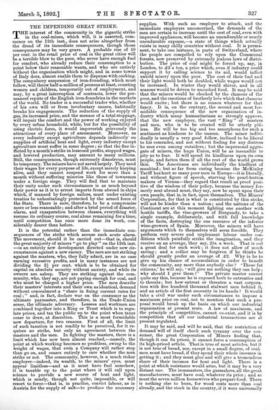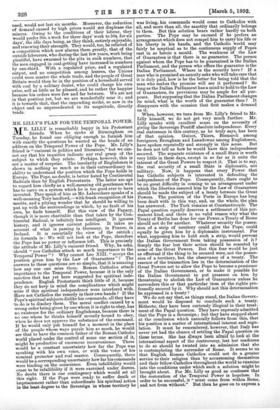THE IMPENDING GREAT STRIKE. T HE interest of the community in
the gigantic strike in the coal-mines, which will, it is asserted, com- mence on the 12th inst., does not arise altogether from the dread of its immediate consequences, though those consequences may be very grave. A probable rise of 50 per cent. in the retail price of coal in the great cities will be a terrible blow to the poor, who never have enough fuel for comfort, who already reduce their consumption to a point below their reasonable wants, and who are entirely without the organisation which might, and in some towns of Italy does, almost enable them to dispense with cooking. The compulsory suspension of iron-founding, which must follow, will throw half-a-million of persons at least, counting women and children, temporarily out of employment, and may, by a great interruption of contracts, lower the per- manent repute of the English iron-foundries in the markets of the world. No trader is a successful trader who, whether of his own will or from involuntary causes, habitually breaks his engagements. The reduction of the supply of gas, its increased price, and the menace of a total stoppage, will impair the comfort and the power of working enjoyed by every urban household, while, but for the possibility of using electric force, it would impoverish grievously the attractions of every place of amusement. Moreover, as every industry except agriculture depends indirectly on supplies of artificial heat and light, every industry except agriculture must suffer in some degree ; so that the fine in- flicted by a month's strike in lessened profits, stopped wages, and lowered production, may amount to many millions. Still, the consequences, though extremely disastrous, must be temporary. The miners have not saved largely. They need their wages for every purpose of life, except merely keeping alive, and they cannot suspend work for more than a month without suffering miseries like those of townsmen under a foreign siege. They will find that to maintain their unity under such circumstances is as much beyond their power as it is to arrest imports from abroad in ships which, if manned by-foreign sailors, must under existing treaties be unhesitatingly protected by the armed force of the State. There is sure, therefore, to be a compromise more or less reasonable ; and after a brief period of disaster, alarm, and exasperation between classes, everything will resume its ordinary course, coal alone remaining for a time, until competition has once more done its work, con- siderably dearer than before.
It is the potential rather than the immediate con- sequences of the strike which arouse such acute alarm. The movement, should it be carried out—that is, should the great majority of miners " go to play" on the 12th inst. —is an entirely new development directed under new cir- cumstances against a new enemy. The men are not striking against the masters, who, they fully admit, are in no case earning excessive profits, and in many instances are not dividing the 21 per cent. which is to be obtained for capital on absolute security without anxiety, and while its owners are asleep. They are striking against the com- munity, who, they say, are not paying enough for coal, and who must be charged a higher price. The men describe their masters' interests and their own as identical, demand without concealment a " share in fixing current rates for coal ; " and, in fact, declare war on the consumer as the ultimate paymaster, and therefore, in the Trade-Union sense, the ultimate adversary. Lessees and workmen are combined together into a Ring or Trust which is to regu- late prices, and tax the public up to the point when taxes cease to draw, at discretion. This is a most formidable new departure, for two reasons. First of all, the limit of such taxation is not readily to be perceived, for it re- quires no strike, but only an agreement between the masters and the men. In fighting the masters, there is a limit which has now been almost reached,—namely, the point at which working becomes so profitless, owing to the weight of wages, that even a Company will rather stop than go on, and ceases entirely to care whether the men strike or not. The community, however, is a much richer employer—indeed, its wealth, to the miners' eyes, must appear limitless—and as it must have fuel somehow, it is taxable up to the point where it will call upon science to provide a new source of heat and light, which is nearly, though not quite, impossible, or will resort to force—that is, in practice, convict labour, as in Austria for the supply of salt—to produce the necessary supplies. With such an employer to attack, and the immediate employers unconcerned, the demands of the men are certain to increase until the cost of coal, even with improved appliances, will become an unendurable or nearly unendurable expense,—a state of things which actually exists in many chilly countries without coal. It is perma- nent, to take one instance, in parts of Switzerland, where the people are compelled to rely upon the Communal forests, now preserved by extremely jealous laws of distri- bution. The price of coal might be forced up, say, in London, to £2 a ton, a price which, even if industry could support it by calling science to its aid, would inflict untold misery upon the poor. The cost of their fuel and their light would. both be doubled, while wages would not be increased. In winter they would shiver, and in all seasons would be driven to uncooked food. It may be said that the miners would be checked by the clamour of the poor, and the emotions of brotherly love which that clamour would excite ; but there is no reason whatever for that fancy. It is, on the contrary, the second and most for- midable consequence of the new organisation of in- dustry which many humanitarians so strongly approve, that the new employer, the vast " Ring " of masters and men, who is to be created will be utterly piti- less. He will be too big and too amorphous for such a sentiment as kindness to the unseen. The miner indivi- dually is usually a very good fellow, inclined to be liberal to his comrades, and not without feeling for any distress he sees even among outsiders ; but the impersonal aggre- gate of miners, the huge Union, will be as insensible to pity as to fear. It will spend its kindliness upon its own people, and fatten them if all the rest of the world grows thin. The Americans are individually the kindliest of mankind ; but so far from caring because the McKinley Tariff has hurt so many poor men in Europe—it is literally, and without figure of speech, starving the pearl-button makers of Vienna—they regard that result as proof posi- tive of the wisdom of their policy, because the money for- merly sent abroad must, they say, now be spent upon their own people, that is, in fact, upon themselves. The Miners' Corporation, for that is what is constituted by this strike, will not be kinder than a nation ; and the nations of the Continent are at this moment fighting one another with hostile tariffs, the vine-growers of Burgundy, to take a single example, deliberately, and with full knowledge of the facts, destroying the one resource of the inferior wine-growers of Spain. Moreover, the miners will have arguments which to themselves will seem forcible. They perform very severe and unpleasant labour under con- ditions which painfully strike the imagination, and they receive on an average, they say, 25s. a week. That is not a great deal for such work ; it does not allow of much saving ; and a collier may be forgiven if he thinks he should greatly prefer an average of £2. Why is he to give up his chance of accumulation in order to benefit the community, any more than anybody else ? Those fat citizens,' he will say, will give me nothing they can help ; why should I give them ? ' The private master cannot quite say this, because he is exposed both to entreaties and to threats ; but how entreat or threaten a vast corpora- tion with five hundred thousand stalwart men behind it, and an article of the first necessity in its hands ? It would take a civil war under such circumstances to impose a maximum price on coal, not to mention that such a pro- posal would break up the basis on which our industrial organisation at present rests. A law of maximum, and the principle of competition, cannot co-exist, and it is by competition that all our industrial transactions are at present regulated.
It may be said, and will be said, that the restriction of demand will of itself check such tyranny over the con- sumer, the great Corporation of Miners finding that, though it can fix prices, it cannot force a consumption of its high-priced article. That is true of most articles, but it is not true of bread, nor, except in a small degree, of coal; men must have bread, if they spend their whole incomes in getting it; and they must give and will give a tremendous share of their incomes for heat and light. There is a point at which resistance would arise, but it may be a very distant one. The ironmasters, the gasmakers, all the great manufacturers, must have coal, whatever its price ; and so must the seven million housewives who prepare food. There is nothing else to burn, for wood costs more than coal already, and the stock in the country, if it were universally used, would not last six months. Moreover, the reduction of demand caused by high prices would riot displease the miners. Owing to the conditions of their labour, they would prefer 308. a week for three days' work to 50s. for six days', the idle days being, as they think, entirely enjoyable, and renewing their strength. They would, too, be relieved of a competition which now alarms them greatly, that of the outside labourers, who during the last few years, work being plentiful, have swarmed to the pits in such numbers, that the men engaged in coal-getting have increased in numbers by one-third. With a regulated price, and a regulated output, and no competition among lessees, the Unions could soon master the whole trade, and the people of Great Britain would then be in the position of a household served with coal by a solitary dealer, who could charge his own price, sell as little as he pleased, and be rather the happier because his orders were few and far between. We are not in that position yet, but we are wonderfully near it ; and it is towards that, that the impending strike, so new in its object and so unprecedented in its magnitude, directly tends.



































 Previous page
Previous page